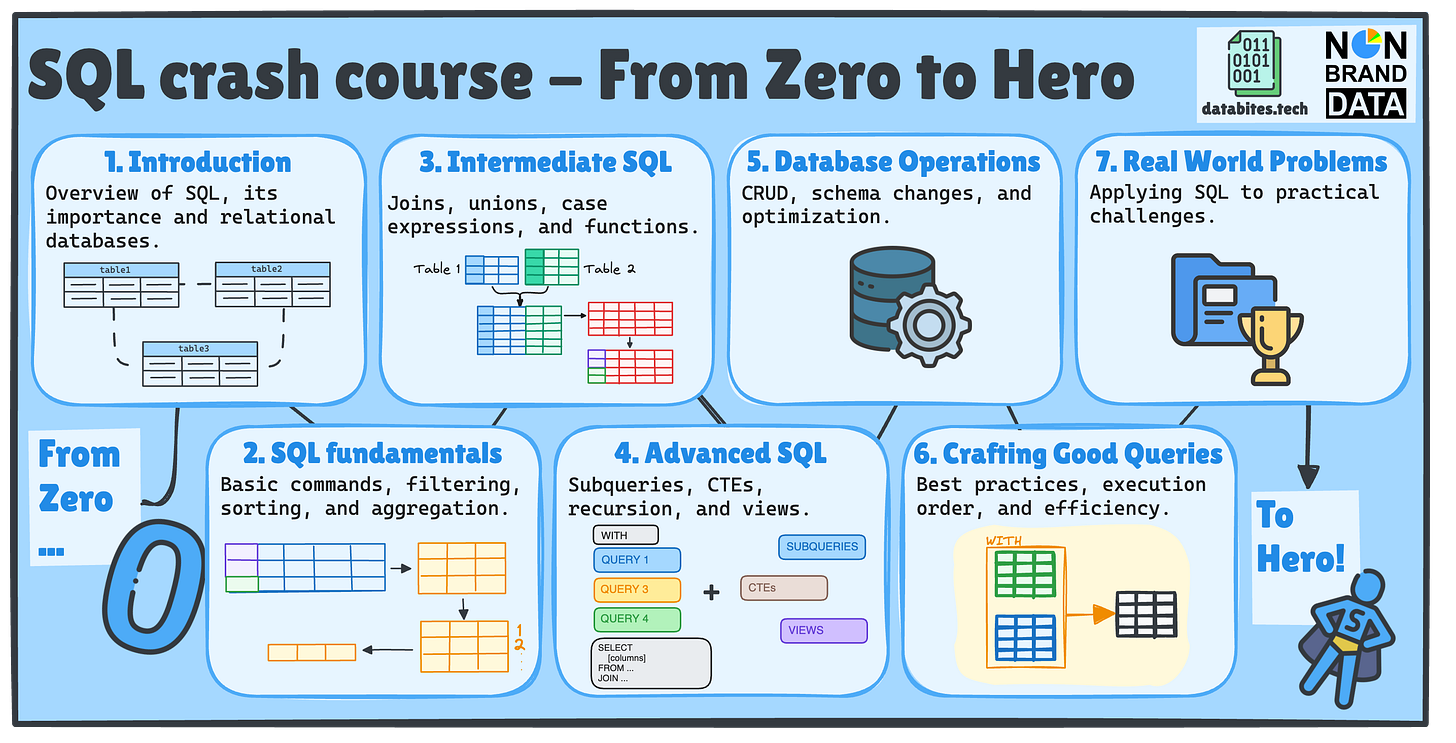Hi everyone! Josep and Cornellius Yudha Wijaya from Non-Brand Data here 👋🏻
As promised, today we are starting our SQL Crash Course, which will take you from zero to hero!🚀
As a reminder, we will cover seven SQL key topics, each separated into multiple posts across Non-Brand Data and DataBites.
Today’s turn is for:
📌 What is SQL? by Cornellius Yudha Wijaya in Non-Brand Data
📌 Why learn SQL? by me in DataBites
So, let’s dive in!
Why SQL? 🚀
If you're looking to break into data science, one of the biggest questions is:
👉 What tool should I learn first?
The answer? SQL.
SQL remains the #1 data language and is by far the easiest to learn. If you want to succeed in data science, here’s the best advice we can give you:
START
LEARNING
SQL
RIGHT
NOW!
Still unsure? Let’s break it down. 👇🏻
The Power of SQL 🔥
Humankind has always been strongly shaped by its ability to store and share information. Studies indicate that a key distinction between humans and other animals lies in our ability to create, preserve, and inherit knowledge and culture across generations.
And guess what… all of this is just DATA!
Today we are amid a significant shift in how our world works:
Data has become the fuel of the XXI century.
All fields and sectors rely on it to make decisions.
One thing is certain: The need for data-related skills will only keep surging.
Organisations today gather raw data from both internal and external sources at an unprecedented rate. By analysing this data, they can use reporting applications, dashboards, and other tools to answer questions and gain valuable insights.
So the right question to be done is how to manage all this data?
And the answer is quite simple: SQL remains the best option to do so.
But why SQL specifically? 🤔
Check out the StackOverflow Developer Survey 2024—SQL ranks as the 2nd (‼️) most used programming language (and #1 in data science 🥇).
Now, let’s explore SQL’s biggest advantages.
So let’s try to understand better SQL’s advantages 💥
SQL’s main advantages
#1. It can deal with big amounts of Data
SQL is designed to work with big data and can handle complex queries on large datasets much faster than other tools like spreadsheets or even some programming languages like Python.
Learning SQL helps you manage and analyze big data effectively.
In many organizations, the core of the data environment is typically a data warehouse, where SQL is the primary language for interaction.
#2. It can be easily integrated with other tools
SQL integrates seamlessly with other data science tools and programming languages, such as Python and R. Libraries like pandas (Python) and dplyr (R) allow you to run SQL queries directly within your code.
This interoperability makes it easier to combine SQL's data handling capabilities with the advanced analytics, visualization and ML features of these languages.
#3. It is standardized
To query or manipulate data with SQL, you use statements with keywords such as SELECT and FROM. This SQL syntax is standardized by ANSI and ISO-certified, ensuring consistency across the hundreds of databases and data tools that support SQL today.
While some databases and tools may extend the syntax with specialized operators, commands, or functions, the fundamental principles of SQL remain consistent.
Once you master the basics of SQL, you can apply this knowledge universally across different platforms.
#4. It is easy to understand
Basic SQL syntax is highly readable, resembling natural language. It outlines how data should be retrieved or manipulated.
Consider the following example query:
SELECT
first_name,
last_name,
date_of_hire
FROM employees
WHERE date_of_hire > '2018-12-31'
ORDER BY date_of_hire, last_nameIn this query, the SQL keywords SELECT, FROM, WHERE, and ORDER BY define the actions to be performed and any person can understand the main purpose of the query.
⚠️ Pro Tip: SQL keywords don’t need to be capitalized, but doing so improves readability.
How to Get Started 🚀
Over the coming weeks, we’ll guide you through:
✅ SQL Fundamentals
✅ Intermediate SQL
✅ Advanced SQL
✅ Database Operations
✅ Writing Efficient Queries
Once you grasp the basics, practice is key! Start working on real-world projects and solving hands-on data problems.
What’s Next? ➡️
This is the first of many posts about the upcoming SQL Courses. It will only explain what SQL is in its crude form.
To get the full experience and fully immersed in the learning:
👉 Subscribe to Databites.tech (By Josep)
👉 Subscribe to Non-Brand Data (By Cornellius)
👉 Check out the SQL Crash Course GitHub repo
👉 Share with your friend and whoever needs it!
🗓️ Every Thursday, you will have two new issues in your inbox!
Let’s dive in and make SQL less scary, more fun, and way more useful! 🚀
Josep & Cornellius








I agree with importance of SQL but NoSQL (not only SQL) databases like MONGODB are better IMHO